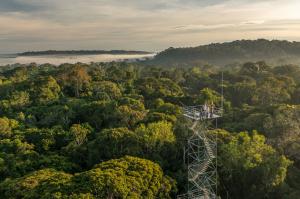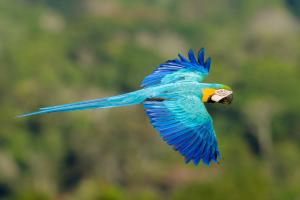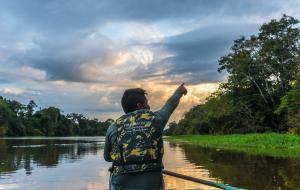Sustainable Travel: A Solution to Amazon Deforestation and the Preservation of Local Communities

Cristalino Lodge stands out as one of the largest private reserves in the Amazon, protecting over 11,000 hectares of forest—an area nearly twice the size of Manhattan Island. Photo: André Dib
As deforestation threatens the Amazon, sustainable travel offers a solution, with startups like PlanetaEXO supporting conservation efforts and local communities
SãO PAULO, SP, BRAZIL, October 9, 2024 /EINPresswire.com/ -- The Amazon Rainforest3, often referred to as the “lungs of the Earth,” is facing one of its most critical challenges in decades. Deforestation rates have skyrocketed, with over 10,000 square kilometers of forest being cleared annually, driven by illegal logging, mining, and land conversion for agriculture. In addition, record-breaking wildfires and persistent droughts are worsening the situation, with over 50,000 active fires across Brazil. Sustainable travel to the Amazon Rainforest is emerging as a viable strategy to combat this environmental crisis while supporting local communities.
PlanetaEXO, a startup dedicated to eco-friendly travel, has been working closely with these communities to offer tours in the Amazon in Brazil1 that prioritize both environmental conservation and community empowerment. “We’ve seen firsthand how ecolodges and locally guided tours help shift the focus away from destructive practices. By connecting travelers with authentic experiences that benefit local communities, we’re promoting a model of tourism that supports both people and the planet.” says Lucas Ribeiro, founder of PlanetaEXO.
According to a report by the World Wildlife Fund (WWF), ecotourism could reduce deforestation in the Amazon by providing an alternative source of income to industries that exploit the rainforest. WWF suggests that responsible tourism can help maintain over 50% of the forest’s biodiversity, while also addressing climate challenges by protecting large swaths of land from forest clearing.
EMPOWERING LOCAL COMMUNITIES THROUGH SUSTAINABLE TRAVEL
The benefits of sustainable travel are not limited to environmental protection. Ecotourism is also creating economic opportunities for local communities, including many indigenous groups, who have long acted as stewards of the Amazon. A powerful example of this transformation, highlighted by Projeto Draft, is the story of Roberto Brito Mendonça from Iranduba, Amazonas. Like his father and grandfather before him, Roberto was a logger, using the forest to support his family. In 2008, when his land became part of the Rio Negro Sustainable Development Reserve, his livelihood was at risk. Faced with uncertainty, Roberto turned to tourism, and by 2012, he began running Pousada do Garrido, one of 24 tourism businesses in the area.
"Access to education and technology is essential for sustainability," says Roberto. "If everyone has this opportunity, we can chart a new course for the forest. The Amazon we want is one full of life - and when I say life, I mean especially the human lives that are part of it." His story is a testament to how sustainable tourism can offer an alternative to extractive industries, allowing local communities to preserve both nature and their way of life.
ECOLODGES LEADING BY EXAMPLE2
Lodges like Uakari Lodge in the Mamirauá Reserve, Tefé, and Cristalino Lodge, in Alta Floresta, Mato Grosso, are prime examples of how ecolodges play a critical role in sustainable travel. Uakari, located in a semi-flooded ecosystem that represents 3% of the Amazon, aims to protect local biodiversity while supporting eleven local communities. The lodge operates with sustainability at its core, using solar energy, collecting and storing rainwater, and treating sewage with microorganisms instead of chemicals. Even the roof tiles are made from recycled plastic bottles.
Guests are encouraged to minimize their energy usage, and all waste is treated before being returned to the river. Through its community tourism model, Uakari provides opportunities and training for local people, ensuring that the lodge’s operations have minimal impact on the environment.
Meanwhile, Cristalino Lodge stands out as one of the largest private reserves in the Amazon, protecting over 11,000 hectares of forest—an area nearly twice the size of Manhattan Island. This vast area is kept in pristine condition, rich in biodiversity, and supports critical conservation efforts. The lodge adopts sustainable architecture that respects nature, with systems for effluent and wastewater treatment, solar water heating, solar energy, and recycling—all protocols designed to minimize the impact of its operations. By limiting the number of guests per guide on every tour, Cristalino ensures a low-impact experience.
Visitors to both lodges embark on guided treks and excursions, experiencing the astonishing complexity of the Amazon’s ecosystems. Uakari Lodge serves as a sanctuary for unique species like the white-faced uakari, while Cristalino Lodge supports research that has documented over 1,356 different plant species, including six previously unknown to science. By promoting low-impact tourism, both Uakari and Cristalino contribute to the preservation of the forest while providing sustainable livelihoods for local communities.
ECONOMIC AND GLOBAL IMPACT OF SUSTAINABLE TRAVEL IN THE AMAZON
The economic comparison between sustainable tourism and private exploitation in the Amazon highlights the importance of eco-friendly travel. According to the World Bank, sustainable tourism in the Amazon is valued at approximately US$2.3 billion annually. Although this represents only around 5% of the US$45 billion generated by private exploitation of the forest through agriculture, timber harvesting, and mining, sustainable travel provides an essential ally in conservation efforts.
Beyond its financial value, sustainable tourism raises awareness of the Amazon’s deforestation crisis and its impact on the global climate. Tourists who witness the destruction firsthand are often inspired to support conservation projects in their home countries. Ecotourism also contributes to environmental education, which helps fostering a deeper understanding of the need for sustainable practices worldwide.
With eco-friendly tours increasingly contributing to nature protection and restoration, ecotourism is able to shape global views on deforestation. Travelers support these efforts, creating a win-win situation where tourism funds the preservation of natural resources in the Amazon.
A CALL TO ACTION
As deforestation continues to threaten one of the world’s most important ecosystems, sustainable travel offers a way forward. By shifting economic incentives and raising global awareness, it is possible to reduce the pressure on the Amazon and protect its biodiversity for future generations.
At PlanetaEXO, we believe that every traveler has the power to make a difference. Our eco-tours offer authentic, responsible tourism experiences that benefit both the environment and the communities that rely on the forest. By choosing sustainable travel, we can all be part of the solution.
Learn more about PlanetaEXO: www.planetaexo.com
Lucas Ribeiro
PlanetaEXO
11 94908-4101
email us here
1 https://planetaexo.com/trips/destinations/brazil/amazon-rainforest-tours/
2 https://planetaexo.com/blog/best-amazon-jungle-lodges-in-brazil/
3 https://planetaexo.com/blog/how-to-visit-amazon-rainforest-brazil/


